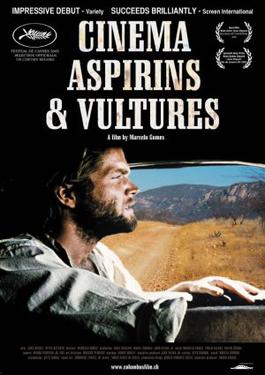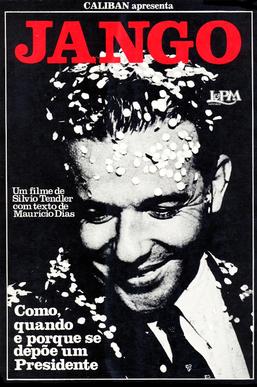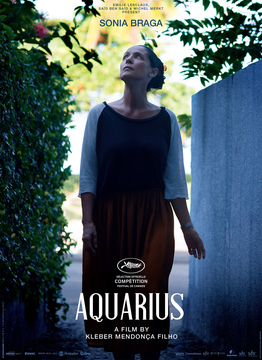Contents
A list of films produced in Brazil in 1981:
A list of films produced in Brazil in 1981:

Maria Bethânia Viana Teles Veloso is a Brazilian singer and songwriter. Born in Santo Amaro, Bahia, she started her career in Rio de Janeiro in 1964 with the show "Opinião" ("Opinion"), she is "The Queen of Brazilian Music". Due to its popularity, with performances all over the country, and the popularity of her 1965 single "Carcará", the artist became a star in Brazil.

Madame Satã is a 2002 Brazilian–French drama film directed and co-written by Karim Aïnouz. Shot in the neighborhoods of Lapa, Glória, Paquetá, and Centro in the Rio de Janeiro city, it tells the story of Madame Satã and premiered in the Un Certain Regard section at the 2002 Cannes Film Festival.

Cinema, Aspirins and Vultures is a 2005 Brazilian film directed and co-written by Marcelo Gomes. It was Brazil's submission to the 79th Academy Awards for the Academy Award for Best Foreign Language Film, but was not accepted as a nominee. It was also screened in the Un Certain Regard section at the 2005 Cannes Film Festival.

Jango is a 1984 Brazilian documentary film directed by Sílvio Tendler.

Andrew "Andrucha" Waddington is a Brazilian film director, producer, and screenwriter.

Perfumed Ball is a 1996 Brazilian film directed by Lírio Ferreira and Paulo Caldas. Starring Duda Mamberti and Luiz Carlos Vasconcelos, it shows the history of how Benjamin Abrahão befriended Lampião, the leader of the Cangaço, and filmed his crimes — a feat the Brazilian army was not able to accomplish. It used footage taken in 1936 for Abrahão's 1959 film Lampião, o Rei do Cangaço.

Silvio Tendler is a Brazilian filmmaker. With more than 40 films released by 2014, including feature and short films, Tendler is one of the most respected Brazilian documentarist. Due to his focus on people like Juscelino Kubitschek, João Goulart, and Carlos Marighella, he is known as "the filmmaker of the defeated" or "the filmmaker of interrupted dreams".

Xuxa Requebra is a 1999 Brazilian musical romantic comedy film directed by Tizuka Yamasaki, with final script by Evandro Mesquita. His cast includes brazilian singer, TV host and actress Xuxa Meneghel, singer Daniel and Elke Maravilha as protagonists of the story, as well as the participation of countless Brazilian artists such as Carla Perez, Luciano Huck and Fat Family.

Sport Lisboa e Benfica is a Portuguese sports club based in Lisbon that was formed in Belém in 1904 by 24 football enthusiasts, including Cosme Damião. Benfica have been part of the Portuguese football top flight, Primeira Liga, since its inception in 1934. They have won 38 championships, 26 Taça de Portugal, 7 Taça da Liga, 8 Supertaça Cândido de Oliveira, 3 Campeonato de Portugal, 1 Latin Cup and 2 European Cups.

Aquarius is a 2016 drama film written and directed by Kleber Mendonça Filho and starring Sônia Braga as Clara, the last resident of Aquarius building, who refuses to sell her apartment to a construction company that intends to replace it with a new edifice. It was selected to compete for the Palme d'Or at the 2016 Cannes Film Festival.

Roberto Carlos e o Diamante Cor-de-Rosa is a Brazilian film released in July 1970, directed and produced by Roberto Farias. The film is the second of a trilogy featuring the singer Roberto Carlos; co-starring with him are his Jovem Guarda musical partners Erasmo Carlos and Wanderléa. It had an audience of 2,639,174 spectators, being the highest-grossing film in Brazil in 1970.
Roberto Carlos a 300 Quilômetros por Hora is aBrazilian film first released in December 1971, directed and produced by Roberto Farias, and written by Bráulio Pedroso.The film had an audience of 2.785.922 spectators, being the highest-grossing Brazilian film of 1971.

Filipe Catto Alves is a Brazilian singer and songwriter. She has worked with genres such as MPB, samba, tango, jazz, rock and bolero. She identifies as non-binary and uses both she/her and they/them pronouns.

Independência ou Morte is a Brazilian Historical drama film directed by Carlos Coimbra and released on September 2, 1972. is based on the life of Emperor Pedro I of Brazil and Empress Maria Leopoldina of Austria, as well as other facts about the Independence of Brazil, is starring Tarcísio Meira, Glória Menezes, Kate Hansen and Dionísio Azevedo.

Lucas Estevan Soares is a Brazilian film director, screenwriter, producer, actor and musician.